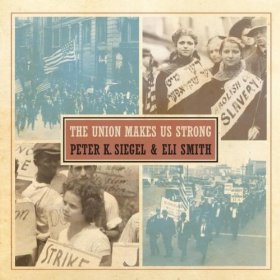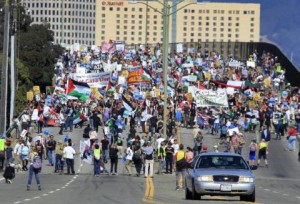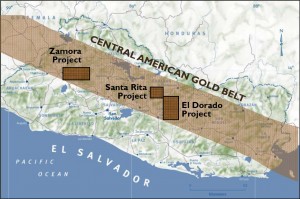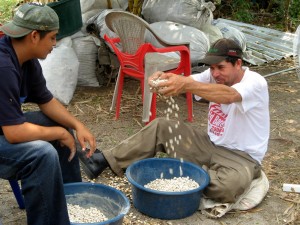Podcast: Play in new window | Download
Updates:
- Michael Ratner: The Dahiya Doctrine, Wikileaks and Julian Assange
- Michael Ratner: U.S. Is The Fundamental Supporter Of Israel War Crimes
- Major Free Speech Court Victory in Brooklyn Bridge Occupy Mass Arrest Class Action
- Update On H.Rap Brown Health And Treatment
——
Labor Day Songs From The Union Makes Us Strong.
Michael Smith and Heidi Boghosian play songs from The Union Makes Us Strong album by Peter Siegel and Eli Smith to honor Labor Day 2014. The historical importance of these songs lie in the role they played in the creation of the union movement in the United States in the first half of the 20th century. They instrumental in propagating the attitudes and ideas the “class consciousness” that led working men and women by the thousands to recognize the need to stand together in solidarity. In short, they shaped a politicized working-class culture based more upon social than individual values.
Songs: There Is Power In the Union / The Preacher And The Slave / The Death of Mother Jones / Song For Bridges.
——
Non-GMO Seed Programs Help Poor Farmers In El Salvador Secede From Monsanto Monopoly
When you hear news reports about the mass migration of unaccompanied children coming across the Mexico – U.S. border, you usually don’t hear about the pressures that are driving the emigration. Today we look at some of the economic and agricultural reasons that cause migrations specifically in El Salvador. One organization helps poor farmers grow and market sees for corn and beans. This program is called the Mangrove Association where the government buys the seeds and distributes them for free to the 400 thousand farmers. However, these are non – GMO seeds, a preference that local communities and the El Salvadoran government had to fight for.
Professor of Law Eleanor Stein:
- My primary work over the last 10 years has been centered on climate change and what can be done to reverse that trend and to change the political climate in which those decisions get made.
- I was interested in this project in El Salvador because I understood that it was based in some local community groups in a very poverty stricken rural area in the southwestern part of the country and they were using very creative methods to develop more of a sustainable agriculture and also to take measures related to adaptation of their region as a result of climate change.
- CAFTA is a trade treaty which the U.S. and Central America are parties and the Dominican Republic and it governs very much like NAFTA. It governs the requirement for procurement of goods and services by governments in those regions.
- El Salvador is a very poor country. It’s still living with the results of a civil war that went from 1979 to 1992 that resulted in the death of almost 80 thousand people.
- When I say a civil war, that doesn’t really capture the full involvement of the U.S. government fully supporting the right wing counter insurgency forces.
- They (Salvadoran government) have put in place a seed program that began in 2012 that was meant to deal with tremendous problems in food insecurity, agricultural non-sustainability and poverty and lack of economic opportunity that exist in the rural areas.
- They’re cooperatives that produce seeds. They’re locally grown, they’re non-GMO and they are apparently more successful than the Monsanto varieties.
- They have a higher germination rate, and they’re much more hardy in their conditions of growth in El Salvador.
- Until fairly recently, Monsanto had been procuring almost all of its seeds from a Monsanto subsidiary in the region and from very few other producers and were arguable in violation of CAFTA because this was a direct procurement without bidding.
- The Millennial Challenge Corporation is a U.S. government agency which is basically a dispenser of aid in the form of grants to countries that have been defined as emerging potential democracies by the State Department.
- This aid package for every country it has been offered has been conditioned on the local government making certain changes. Legislative changes to bring the economy of the recipient country more in line with the neo-liberal trade policies.
- For example, they tried to get the El Salvadoran legislature to privatize water in their country.
- This is one of few places in the world where a region has been able to secede from the Monsanto monopoly.
- Mangrove Association.There were able to provide for free to more than 400 thousand farmers these very high quality seeds. This is a concrete effective local program that is really combating hunger and food insecurity and its at a time when tens of thousands of children from El Salvador are trying to emigrate to the United States because of not only violence but poverty and lack of opportunity in El Salvador.
- Both the violence and the poverty and the lack of economic development are rooted in the war in the history of El Salvador and the history of the U.S. role in that war.
- I think the underlying condition not only for the emigration but for the violence itself is the lack of infrastructure, the lack of development, the lack of opportunity that continues to haunt this country that was under the rule of an oligarchy for 60 or 70 years.
- We didn’t meet a single family that had indoor plumbing. People are living under really difficult conditions.
- www.eco-viva.org
Guest – Eleanor Stein, teaches a course called the Law of Climate Change: Domestic and Transnational at Albany Law School and SUNY Albany, in conjunction with the Environmental and Atmospheric Sciences Department at SUNY. Eleanor Stein is teaching transnational environmental law with a focus on catastrophic climate change. For ten years she served as an Administrative Law Judge at the New York State Public Service Commission in Albany, New York, where she presided over and mediated New York’s Renewable Portfolio Standard proceeding, a collaboration and litigation of over 150 parties, authoring in June 2004 a comprehensive decision recommending a landmark state environmental initiative to combat global warming with incentives for renewable resource-fueled power generation.
————————————————————–



